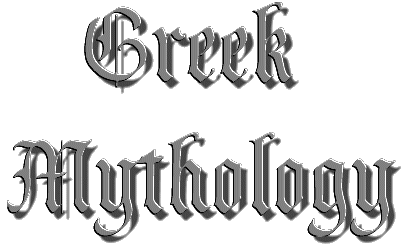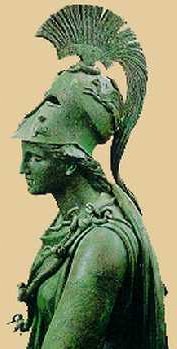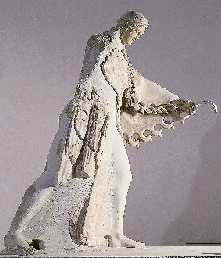


Athena
The adorable goddess of the Athenians
![]() or the ancient Greeks, Athena, one of the most important
Olympian deities, was the goddess of wisdom and skill.
or the ancient Greeks, Athena, one of the most important
Olympian deities, was the goddess of wisdom and skill.
The fact that Athena was born from the
head of Zeus and never received a mother's care meant that her powers
were more masculine than feminine. Above all, she was martial goddess, one who had entered
life dressed for war and uttering battle-cries. Her military accoutrements included a
helmet, a spear and the aegis, a goat-skin shield which
Amaltheia had given Zeus and which only Athena was entitled to use. To the shield was
fastened the gorgoneum, the head of Gorgo the Medusa
which turned to stone anyone who set eyes upon it. Athena was also alone in being allowed
to enter her father's armory, and could even use his thunderbolt. The frequently-used
epithet Athena Hippia ('of the horses') is also
associated with the military prowess of the goddess. According to the relevant myth, it
was Athena who taught mankind how to tame the horse, and she gave Bellerophon a golden
bridle to enable him to break in the winged horse Pegasus (for which she was known as Athena Chalinites, "of the bridle"). When Athena
Hippia tamed the wild horse, she acquired a fresh dimension in the minds of the Greeks:
now she became the goddess of ingenuity and skill, representing the concept of the
superiority of the mind over physical power and the violence of war. She was responsible
for the development of all the crafts and techniques that made it easier for man to live
in peace. Architects, sculptors and painters honored her as their patron. It was Athena,
too, who made man's first weapons and tools, and she who taught the arts of
ship-building(to the Argonauts), plugging the fields with oxen, making pottery on the
wheel, working bronze, and creating objects in gold. Her greatest invention of all,
however, was the art of weaving.
the
head of Zeus and never received a mother's care meant that her powers
were more masculine than feminine. Above all, she was martial goddess, one who had entered
life dressed for war and uttering battle-cries. Her military accoutrements included a
helmet, a spear and the aegis, a goat-skin shield which
Amaltheia had given Zeus and which only Athena was entitled to use. To the shield was
fastened the gorgoneum, the head of Gorgo the Medusa
which turned to stone anyone who set eyes upon it. Athena was also alone in being allowed
to enter her father's armory, and could even use his thunderbolt. The frequently-used
epithet Athena Hippia ('of the horses') is also
associated with the military prowess of the goddess. According to the relevant myth, it
was Athena who taught mankind how to tame the horse, and she gave Bellerophon a golden
bridle to enable him to break in the winged horse Pegasus (for which she was known as Athena Chalinites, "of the bridle"). When Athena
Hippia tamed the wild horse, she acquired a fresh dimension in the minds of the Greeks:
now she became the goddess of ingenuity and skill, representing the concept of the
superiority of the mind over physical power and the violence of war. She was responsible
for the development of all the crafts and techniques that made it easier for man to live
in peace. Architects, sculptors and painters honored her as their patron. It was Athena,
too, who made man's first weapons and tools, and she who taught the arts of
ship-building(to the Argonauts), plugging the fields with oxen, making pottery on the
wheel, working bronze, and creating objects in gold. Her greatest invention of all,
however, was the art of weaving.
Throughout antiquity she was renowned as possessing the highest skills in this field,
and it was she who wove and embroidered the superb garments worn by the gods and heroes.
Her first pupil at the loom was Pandora, who passed on the knowledge to the other women. This
attribute of Athena's was the source of the myth of Arachne,
This
attribute of Athena's was the source of the myth of Arachne,
another skillful weaver who dared to compare herself
to the goddess and challenge her to a competition. The goddess turned Arachne into a
spider (still known by
that name in Greek today) and condemned her to spin
in perpetuity but to have all her works destroyed by man.
The peaceful side of Athena's character was
symbolized by the olive, the tree which she gave to the Athenians and taught them how to cultivate. According to the myth, it
came about that there was a contest between Athena and Poseidon over which of them should
be the patron of the city of Athens. The other gods advised Athena and Poseidon to offer
the city
one gift each, and the winner of the contest would be
he or she whose gift was the better. Both ascended to the Acropolis, and Poseidon struck
the ground with his trident: a spring of salt water immediately welled up. Athena stamped
her foot, and an olive, the first in the world, sprouted on the spot. In the end, the city
was awarded to Athena, and took its name from her. The divine olive tree continued to
adorn the sacred rock, and when the Persians burned the Acropolis in 480 BC it immediately
put out fresh leaves. In commemoration
of this, an olive tree has been planted on the Acropolis and can be seen today on the
west side of the Erechtheum.
